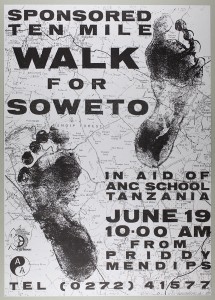Walking and Thinking
On Sunday 15th July, a handful of us from the ‘On the Move’ team joined members of Bristol ACTSA on their annual ‘Walk for Southern Africa’ on the Mendips. It was a thoroughly enjoyable day, a mixture of conversation, mildly strenuous physical activity and excellent cake. The walk itself holds a particularly significant place in the history of Bristol Anti-Apartheid – beginning in 1980, it becameone of the central features of the movement’s calendar, and by the late 1980s hundreds of supporters walked the ten mile route through the countryside near Priddy, taking in the Ebbor Gorge and some stunning views of the Somerset Levels and Glastonbury. The walk originated as a response to the Soweto Uprisings of 1976-77, with many anti-apartheid groups across Britain holding an annual walk for Soweto during the 1980s, raising money to support the Solomon Mahlangu Freedom College in Tanzania, set up by the ANC in the aftermath of the Soweto Uprising.
What struck me about the walk is, despite its deep connection with the movement’s history and the history of the South African freedom struggle, its apparent disconnection from the movement’s general repertoire of protest activities. Removed from the urban settings of much anti-apartheid protest, this was (and is), I think, a way for Bristol Anti-Apartheid to get to know itself to re-connect with old friends and forge new connections. After the walk, I asked its originator, Bevis Miller, why he had urged Bristol AAM to stage the walk in the Somerset countryside rather than the city and his answer was straightforward: ‘fun’. This was a social event and it remains so today. Within minutes of setting off, people were getting re-acquainted, asking after mutual friends, and reminiscing about past experiences of the walk.
As a researcher, I found the walk an immensely important experience. The practice of walking, a focus of increasing interest for academics, lends itself well to the process of co-production, a shared experience that creates a very different and neutral space for conversation. Situationists talk of the practice of the dérive, a method of walking that encourages ‘intensified sensitivity to place’. This walk, though, was more about sociability than the landscape. Yes, the walking practice of activists has re-inscribed the pathways of the Mendips with transnational stories linked to southern Africa, but the boundary crossings that were most apparent to me yesterday were those between researcher and ‘subject’ – no bad thing when the agenda is to facilitate co-production. Participation has, of course, long been a central feature of anthropological research, and it is also a critical element in any genuine productive collaboration between academics and the community. Walking with members of a partner organisation can be a powerful tool for co-production. And a pretty decent way to spend a summer’s afternoon.
More information about Bristol Action for Southern Africa is available online.
